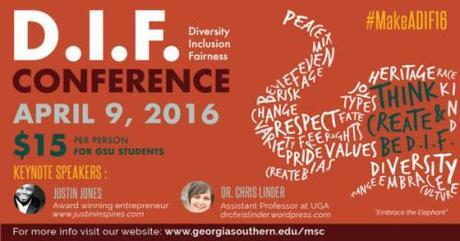Wonder if the campus would be inclusive of pro-life and conservative groups?

From Campus Reform: Georgia Southern University (GSU) is hosting a conference to help students “understand the value of inclusivity” with sessions that include, “Modern responses to systemic anti-black racism & white supremacy,” and, “The basics of privilege for those who just don’t quite get it.”
The theme of SGU’s inaugural Diversity, Inclusion, and Fairness (D.I.F.) conference on April 9 is, “Embrace the Elephant. Think. Create. Be D.I.F.”
“Many people say that it is difficult to talk about the ‘elephant’ in the room. Our goal is that…conference attendees will be more prepared and comfortable to address these important issues that affect us all,” Dorsey Baldwin, director of the Multicultural Student Center, told Campus Reform.
Baldwin explains that the mission of the conference is to create an opportunity for students, faculty and staff to openly talk, listen and learn about diversity, inclusion and fairness.
Sponsored by the Multicultural Student Center, “Embrace the Elephant” opens with a keynote speech titled, “Hug an Elephant, Kiss a Giraffe: Redefining Diversity in Everyday Life,” by Justin Jones-Fosu, an inspirational speaker who focuses on leadership, diversity, and student success.
There are sixteen sessions included in the all-day conference, all focused on diversity and inclusion.
One of the sessions called “How to Get Away With Prejudice,” will explore the use of microaggressions in the United States. “‘What exactly are you?’ ‘What sport do you play?’ ‘That’s so gay.’ [These are] phrases that permeate college campuses and our society as a whole. Attendees will be able to identify common microaggressions and develop strategies to interrupt the use of these terms,” the description says, “This presentation is intended for those with little-to-no familiarity with recognizing and interrupting microaggressions.”
“The Basics of Privilege for Those Who Just Don’t Quite Get It,” is an interactive conversation about what privilege is. The description says that this session will include “visual activities” to see differences in privilege among peers. “Participants will gain a better understanding of the areas of privilege and how to self-identify the areas in which they have or lack privileges. Privilege is not a one-time lesson, but a field of study,” the description states.
A roundtable discussion called “Intra-Communal Allyship” will focus on “cross communal support in identity affirmation” among Native, Asian, Black, and Latino participants, whom are “strongly encouraged to attend,” instead of centering the discussion on “the ways white people can be better allies to people of color.”
“Clap Back Season: Modern Responses to Systemic Anti-Black Racism & White Supremacy’ … will explore the art of social media clap back as a response to systemic racial oppression,” says the description of another session. In this session, geared to African American men, participants will attempt to better understand concepts such as “social capital theory, unconscious bias, stereotype threat, and the historical context that shapes our current outcomes.”

Other sessions include; “The Light I Reflect: Choosing How I Present My Identities, Today,” “Extreme Self-Care and Self-Love for Women,” “Challenging Socio-Cultural Boundaries through Reflexive Awareness,” and “Build Bridges NOT Walls!”
The conference closes with a speech by Dr. Chris Linder, an assistant professor at the University of Georgia, who researches “activist identity development” and how to create an inclusive campus environment.
Linder says on her website that the reason she speaks on these topics is because, “Coupled with my whiteness, my identity as a cisgender woman who presents as ‘traditionally feminine,’ significantly influences my experience in classrooms. I believe that I can often say things that people who do not share my identities cannot say without significantly more resistance.”

Baldwin explains that the reason this conference is so important is that the Student Center wants attendees to develop an understanding about D.I.F. “We want participants to…increase their awareness of their identities, biases and privileges, understand the value of inclusivity and how individual actions impact our environments, and identify and develop the necessary skills to create positive and strategic change on the campus and in their communities,” Baldwin says.
BLAH, BLAH, BLAH, BLAH, BLAH.
DCG

